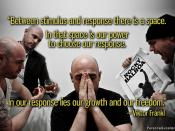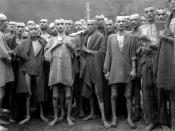In his work Man's Search for Meaning, Viktor E. Frankl narrates his experience in a concentration camp which led to his development of logotherapy, a form of existential psychoanalysis. He was an abused prisoner in Nazi concentration camps, and there he found himself contemplating to his own bare existence. His entire family was killed in these camps, and his possessions as well as much of his life's work were taken from him. In the brutal environment of the concentration camps, he was threatened with immediate death at all times. One wonders how he could refrain from suicide and continue to find life worthwhile. I feel that his credentials as a psychiatrist are buoyed by his witnessing such extreme and horrific events. Because he has faced and survived these conditions, his arguments to me are much more convincing. Frankl, more than any of the philosophers we have studied this semester, seems more able to accurately view the human condition wisely and compassionately.
Frankl's argument seems extremely truthful, since he bases them upon experiences so challenging and terrible that most of us cannot begin to imagine them.
Frankl observed the phenomenon that many of the prisoners of the concentration camp died while experiencing less hardship and suffering than those who survived. The survivors were, in general, people who envisioned a future for themselves despite their present suffering and believed they had a meaning in life. They did not succumb to despair because they continued to live through focusing upon this meaning. Based upon these observations, he developed a psychological treatment method called logotherapy, which he describes in detail in the second section of the book. Frankl describes logotherapy as striving to find a meaning in one's life in order to escape despair and depression. Frankl helped patients improve their mental health...


